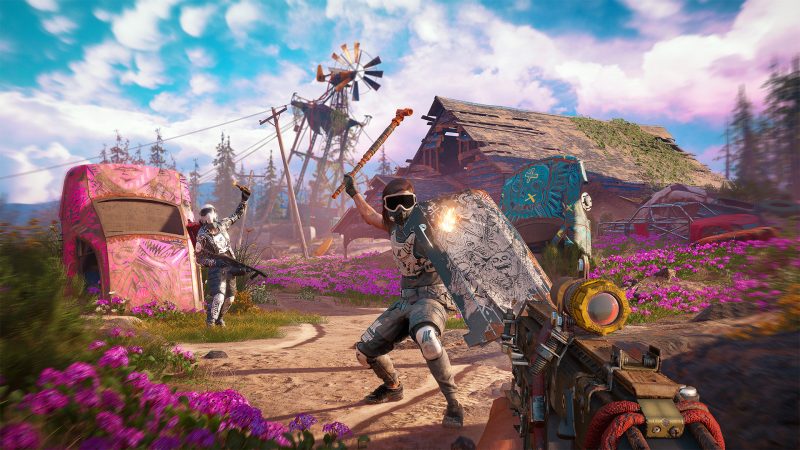Artificial Intelligence, or AI, is transforming the gaming world in remarkable ways. It brings game characters to life, makes gameplay adapt to your skill level, and creates smarter, more interactive experiences. AI ensures that games remain engaging without becoming repetitive, pushing the boundaries of what’s possible in gaming.
Its influence extends beyond traditional console and PC games, enhancing online platforms and multiplayer systems with personalized features and seamless functionality. From refining challenges to optimizing security, AI is everywhere, quietly powering the experiences players enjoy.
As gaming continues to evolve, AI stands as the driving force behind today’s innovations and tomorrow’s possibilities. It’s more than a buzzword—it’s the technology shaping how we play and experience games in ways that were once unimaginable.
What is AI in Gaming?
Artificial Intelligence in gaming is all about creating smart systems that mimic human decision-making. It powers elements like non-player characters (NPCs) that move, react, or even outsmart players in real time. Another example is pathfinding, where AI ensures characters navigate the game world efficiently. You’ve also got dynamic environments that adjust based on what’s happening in the game, keeping things fresh and unpredictable. Simply put, AI helps games feel more alive and interactive.
The Evolution of AI in Video Games
AI in gaming has come a long way. Early arcade games used basic scripts to create simple challenges—think Pac-Man’s ghost movement. Fast forward to now, and we’ve got NPCs with personalities and games like “Red Dead Redemption 2,” where AI controls a world bustling with life. Developers now use AI to simulate realistic behaviors and push storytelling to new levels, making every game feel unique.
AI makes games fun by keeping them challenging and engaging. It adapts to how you play, ensuring the experience feels neither too hard nor too easy. Personalization is another win; AI tracks your preferences and tweaks the game to suit you. Whether it’s a single-player story or an online match, AI’s ability to create these tailored experiences keeps players coming back for more.
AI’s Impact on Online Gaming Experiences
AI is reshaping online gaming by making it more balanced, safe, and tailored to individual players. Its presence ensures smoother experiences, both in gameplay and community management.
AI in Player Matchmaking
Matchmaking is one of AI’s most impactful contributions to multiplayer games. By analyzing player performance, skills, and behaviors, AI forms teams that are evenly matched, creating competitive but fair environments. Games like Fortnite and Call of Duty rely heavily on this technology to enhance player satisfaction and keep matches engaging.
AI-Driven Moderation Tools
AI plays a crucial role in maintaining healthy online communities. It identifies toxic behaviors, flags inappropriate language, and even detects cheating in real time. By automating these tasks, AI helps create a safer and more inclusive space for gamers. This technology ensures that online interactions remain enjoyable and free from harmful distractions.
Enhancing Gaming Experiences with AI
AI is revolutionizing online gaming by delivering highly personalized and secure experiences. It analyzes player preferences to recommend games tailored to individual tastes, enhancing enjoyment and engagement. In social casino platforms, AI enhances gameplay by creating realistic interactions and ensuring fairness. Exploring how free casino games provide accessible entertainment further illustrates AI’s role in offering enjoyable and inclusive gaming experiences. With its ability to adapt content and promote safety, AI continues to shape the future of online gaming.
How AI is Used in Modern Video Games
AI is the engine behind some of the most impressive advancements in gaming today. From smarter characters to worlds that feel endless, here’s how it’s changing the way we play:
AI in NPC Design
Non-Player Characters (NPCs) are becoming more intelligent and unpredictable thanks to AI. They react to your actions in ways that feel human, creating immersive and dynamic gameplay.
Examples in Action:
- Enemies in The Last of Us coordinate to surround players.
- Bosses in Elden Ring adjust their attack patterns to match your tactics.
- Companions in Fallout 4 alter their responses based on your decisions.
Procedural Generation and World-Building
AI allows developers to build vast, unique worlds through procedural generation. This technology automates the creation of landscapes, ensuring no two areas feel the same.
Why It Matters:
- Reduces time spent on world-building.
- Keeps gameplay fresh with endless exploration opportunities.
- Adds depth and unpredictability to every playthrough.
Real-Time Adaptation in Gameplay
Games use AI to adjust difficulty on the fly, ensuring a balanced experience. Whether you’re a novice or a pro, the game adapts to your skills seamlessly.
Key Benefits:
- Makes games accessible to players of all levels.
- Keeps challenges engaging and fair.
- Prevents repetitive experiences as players improve.
This is how AI turns ordinary games into extraordinary adventures, keeping players hooked and coming back for more.
Challenges and Ethical Considerations
AI in gaming brings exciting possibilities but also raises challenges that need attention.
- The Risk of AI Misuse
Overuse of AI could limit player creativity and lead to overly predictable experiences. There’s also concern about AI replacing human developers, risking the creative essence of game design. - Privacy and Data Security
AI relies on player data, raising risks of breaches or misuse. Developers must prioritize transparency and ethical practices to protect user information and build trust. - Ensuring Inclusivity in AI Design
Bias in AI can alienate certain groups, making inclusivity a key focus. Efforts are underway to create fair systems that represent all players equally.
By addressing these challenges, the gaming industry can use AI responsibly, ensuring it enhances creativity and fairness without compromising player trust.
Conclusion
AI is revolutionizing gaming, offering smarter systems, adaptive gameplay, and immersive worlds. While it enhances experiences, challenges like data security and inclusivity need careful attention. By addressing these concerns, AI can continue to shape a future where gaming remains innovative, engaging, and accessible to all.

 1 month ago
203
1 month ago
203







![Anime Reborn Units Tier List [RELEASE] (November 2024)](https://www.destructoid.com/wp-content/uploads/2024/11/anime-reborn-units-tier-list.jpg)
